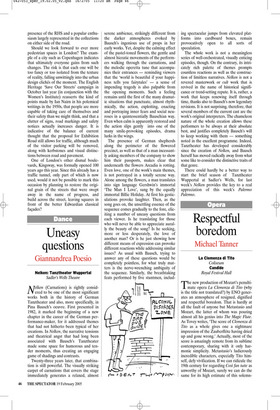Uneasy questions
Giannandrea Poesio
Nelken: Tanztheater Wuppertal Sadler’s Wells Theatre Nelken (Carnations) is rightly considered to be one of the most significant works both in the history of German Tanztheater and also, more specifically, in Pina Bausch’s oeuvre. First presented in 1982, it marked the beginning of a new chapter in the career of the German performance-maker, for it addressed themes that had not hitherto been typical of her creations. In Nelken, the narrative tensions and theatrical angst that had long been associated with Bausch’s Tanztheater made some space for humorous and tender moments, thus creating an engaging game of shadings and contrasts.
Twenty-three years later, that combination is still powerful. The visually striking carpet of carnations that covers the stage immediately generates a relaxed, almost serene ambience, strikingly different from the darker atmospheres evoked by Bausch’s ingenious use of props in her early works. Yet, despite the calming effect of the pastel-toned flowers, the gentle and almost hieratic movements of the performers walking through the carnations, and the melodic operetta tune that accompanies their entrances — reminding viewers that the ‘world is beautiful if your happiness tells you fairytales’ — a sense of impending tragedy is also palpable from the opening moments. Such a feeling remains until the first of the many dramatic situations that punctuate, almost rhythmically, the action, exploiting, enacting and portraying inner fears and social neuroses in a quintessentially Bauschian way. Even when calm is apparently restored and the action slips gently into one of the many smile-provoking episodes, drama lurks in the wings.
The presence of German shepherds along the perimeter of the flowered precinct, as well as that of a man incessantly asking members of the company to show him their passports, makes clear that underneath the flowers Arcadia is rotting. Even love, one of the work’s main themes, is not portrayed in a totally serene way. Alone among the flowers, a man translates into sign language Gershwin’s immortal ‘The Man I Love’, sung by the equally immortal Billie Holiday. At first his gesticulations provoke laughter. Then, as the song goes on, the unsettling essence of the sequence comes gradually to the fore, eliciting a number of uneasy questions from each viewer. Is he translating for those who will never be able to appreciate aurally the beauty of the song? Is he seeking, more or less desperately, the love of another man? Or is he just showing how different means of expression can provoke different reactions while addressing similar issues? As usual with Bausch, trying to answer any of these questions would be completely pointless, for what truly matters is the nerve-wrenching ambiguity of the sequence. Similarly, the breathtaking feats performed by five stuntmen, includ ing spectacular jumps from elevated platforms into cardboard boxes, remain provocatively open to all sorts of speculation.
The whole work is not a meaningless series of well-orchestrated, visually enticing episodes, though. On the contrary, its intricately rich palette of themes prompts countless reactions as well as the construction of limitless narratives. Nelken is not a revered masterwork or cult work that is revived in the name of historical significance or trend-setting repute. It is, rather, a work that keeps renewing itself through time, thanks also to Bausch’s now legendary revisions. It is not surprising, therefore, that several members of the current cast are the work’s original interpreters. The chameleon nature of the whole creation allows these performers to be always at their absolute best, and justifies completely Bausch’s will to keep working with them — something noted in the excellent programme. Indeed, Tanztheater has developed considerably since the creation of Nelken, and Bausch herself has moved radically away from what some like to consider the distinctive traits of that genre.
There could hardly be a better way to start the brief season of Tanztheater Wuppertal at Sadler’s Wells, for last week’s Nelken provides the key to a real appreciation of this week’s Palermo Palermo.

















































 Previous page
Previous page